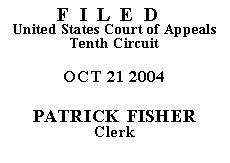

| UNITED STATES OF AMERICA, |
|
ORDER AND JUDGMENT(*)
Before TACHA, Chief Circuit Judge, and
PORFILIO and BRORBY, Senior
Circuit Judges.
After examining the briefs and appellate record, this panel has determined
unanimously that oral argument would not materially assist the determination of
this appeal. See Fed. R. App. P. 34(a)(2); 10th Cir. R. 34.1.9(G). The case is
therefore ordered submitted without oral argument.
Appellant Amado Barrera-Hermosillo, a federal prisoner represented by counsel, plead guilty to one count of aggravated reentry of a deported alien, in violation of 8 U.S.C. §§ 1326(a)(1) and (2) and (b)(1). Mr. Barrera-Hermosillo committed this offense while serving a term of supervised release on a conviction for illegal reentry, for which he received a twenty-seven month sentence. For the more recent offense, the district court sentenced Mr. Barrera-Hermosillo to eighteen months imprisonment and three years supervised release, to run consecutively to his prior twenty-seven month sentence. Pursuant to an Anders brief filed by his counsel, Mr. Barrera-Hermosillo appeals the district court's determination his instant sentence should run consecutively to his prior sentence. See Anders v. California, 386 U.S. 738, 744 (1967). Exercising our jurisdiction under 28 U.S.C. 1291 and 18 U.S.C. § 3742(e), we affirm Mr. Barrera-Hermosillo's conviction and sentence.
During sentencing, Mr. Barrera-Hermosillo's counsel requested his sentence for the more recent conviction for illegal reentry run concurrently with his prior sentence for the same crime; in contrast, the government requested a consecutive sentence. In determining Mr. Barrera-Hermosillo's sentence for his instant conviction should run consecutively to his prior sentence, the district court found Mr. Barrera-Hermosillo violated his conditions of supervised release by illegally reentering the country. It also considered his criminal history, including numerous counts of criminal trespass, theft, battery, illegal reentry, public drunkenness and shoplifting, in concluding Mr. Barrera-Hermosillo "is the kind of defendant that the Sentencing Commission had in mind when they, under their policy statements, stated that the time for supervised release should be run consecutive instead of concurrent." Accordingly, the district court explicitly exercised its sentencing authority under 18 U.S.C. § 3553 and followed the policy guidelines of the Sentencing Commission in sentencing Mr. Barrera-Hermosillo to a consecutive sentence.
After Mr. Barrera-Hermosillo filed a timely notice of appeal, his counsel filed an Anders appeal brief, alleging no meritorious appellate issues exist and requesting an order permitting him to withdraw as Mr. Barrera-Hermosillo's counsel. See Anders, 386 U.S. at 744. Specifically, his counsel points out the district court clearly has discretion, under both 18 U.S.C. § 3584(a) and Chapter 7 of the United States Sentencing Guidelines, to impose a consecutive sentence. His counsel also relies on other cases to demonstrate the district court "has discretion to impose either a consecutive or concurrent sentence for a supervised release violation, and it does not err when it applies the policy statement" to that effect. Finally, counsel notes Mr. Barrera-Hermosillo's sentence is reasonable because it falls within the Sentencing Guidelines. Pursuant to Anders, this court gave Mr. Barrera-Hermosillo an opportunity to raise points in response to the Anders brief, to which he did not respond. Id.
"A district court generally has broad discretion to impose a consecutive or concurrent sentence." See United States v. Hurlich, 293 F.3d 1223, 1230 (10th Cir. 2002); see also 18 U.S.C. 3584(a). We review a district court's decision to impose a consecutive sentence for an abuse of discretion. Hurlich at 1230. "In exercising its discretion to impose a concurrent or consecutive sentence, the district court must provide reasons for its decision" which are "relevant to the determination of an appropriate sentence for the instant offense." Id. (quotation marks and citation omitted). In determining the appropriate sentence, the district court shall consider the statutory factors embodied in 18 U.S.C. § 3553(a), which include, but are not limited to, the nature and circumstances of the offense, the history and characteristics of the defendant, reflection of the seriousness of the offense, and the applicable sentencing guidelines and pertinent policy statements. See generally 18 U.S.C. § 3553(a)(1)-(7). The Sentencing Guidelines, with respect to a violation of supervised release, specifically state that the district court "may order a term of imprisonment to be served consecutively or concurrently," but that '[i]t is the policy of the Commission that the sanction imposed upon revocation is to be served consecutively to any other term of imprisonment imposed for any criminal conduct that is the basis of the revocation." USSG Ch. 3, Pt.B, intro. comment.
In this case, the district court acted within its discretion in ordering Mr. Barrera-Hermosillo's federal sentences to run consecutively. It also explicitly provided its reasoning, which included consideration of his extensive criminal history, which included repeated violations for reentry into this country, the violation of his supervised release, the Sentencing Guidelines and the relevant policy statements. Under the circumstances presented, the reasons cited are clearly relevant to the determination to impose a consecutive sentence and therefore, the district court did not abuse its discretion in sentencing Mr. Barrera-Hermosillo to such a sentence.
After a careful review of the record on appeal, we grant counsel's motion to withdraw and AFFIRM Mr. Barrera-Hermosillo's conviction and sentence.
Entered by the Court:
WADE BRORBY
United States Circuit Judge
*. This order and judgment is not binding precedent except under the doctrines of law of the case, res judicata and collateral estoppel. The court generally disfavors the citation of orders and judgments; nevertheless, an order and judgment may be cited under the terms and conditions of 10th Cir. R. 36.3.